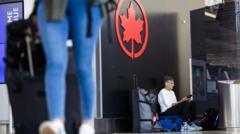Will Air Canada Soar Again After Union Reaches Pay Deal?

Understanding the Air Canada Flight Crew Dispute: What Happened and What It Means for Travelers
The recent dispute between Air Canada's flight crew and the airline has drawn significant attention, particularly due to its impact on travelers. With thousands of passengers stranded and numerous flights grounded, the situation highlighted not only the challenges within the airline industry but also the critical importance of labor relations and contract negotiations. As of now, a tentative agreement has been reached, but what does this mean for the future of Air Canada and its customers? This article delves into the details of the dispute, the resolution, and its broader implications.
Background of the Dispute
The conflict began when more than 10,000 flight attendants represented by the Canadian Union of Public Employees (CUPE) walked out in protest over issues related to pay and scheduling. The strike, which commenced on a Saturday, left many passengers stranded at airports, causing widespread disruption and frustration. The union's actions emphasized the growing discontent among flight crew members regarding their compensation and work conditions.
Negotiations and the Role of Mediation
Negotiations between Air Canada and CUPE escalated quickly, particularly after the Canadian Industrial Relations Board issued a return-to-work order that CUPE rejected. This refusal set the stage for significant disruptions in airline operations, prompting the need for mediation. After nine hours of discussions facilitated by an appointed mediator, a tentative agreement was reached, allowing flights to resume later that Tuesday evening.
The Terms of the Agreement
While specific details of the agreement have yet to be disclosed, Air Canada confirmed that the flight crew will have the opportunity to ratify the deal. In previous negotiations, Air Canada proposed a 38% total increase in compensation over four years, with a significant 25% raise in the first year. However, CUPE characterized the offer as falling short of market standards, inflation rates, and even minimum wage levels.
Impact on Passengers and Airline Operations
The grounding of flights and the subsequent strike had immediate repercussions for travelers. With thousands left stranded, Air Canada faced criticism not only for the operational disruptions but also for how it managed communication with customers during the crisis. As the airline resumes operations, it may take several days to return to full service, given the complexities of repositioning both staff and aircraft.
Broader Implications for the Airline Industry
This dispute is part of a larger trend within the airline industry, where labor relations are increasingly strained. As airlines recover from the impacts of the COVID-19 pandemic, issues like worker compensation, job security, and working conditions have come to the forefront. The resolution of this dispute may set a precedent for future negotiations within the sector, influencing not only Air Canada but also other airlines facing similar challenges.
Conclusion: What Lies Ahead for Air Canada and Its Crew
As Air Canada navigates the aftermath of this dispute, the focus will shift to the ratification of the agreement by the flight attendants. The outcome will likely impact the morale of the crew and the operational efficiency of the airline moving forward. In this evolving landscape, it is crucial for airlines to prioritize open communication and fair labor practices to avoid future disruptions.
Frequently Asked Questions
What caused the Air Canada flight crew strike?
The strike was primarily caused by disputes over pay and scheduling, with flight attendants expressing dissatisfaction with the compensation offered by the airline.
How many flights were affected by the Air Canada strike?
The strike grounded numerous flights, stranding thousands of passengers. The exact number of affected flights has not been disclosed but was significant enough to disrupt operations across the airline.
What is the expected timeline for Air Canada to return to full service?
Air Canada stated that while flights would resume on Tuesday evening, it may take several days for the airline to return to full operational capacity due to repositioning of aircraft and crew.
Will the terms of the agreement be made public?
Air Canada has indicated that it will not comment on the specifics of the agreement until it has been ratified by the flight attendants' union.
As we watch the unfolding situation with Air Canada, it raises questions about the future of labor relations within the airline industry. Will airlines prioritize fair treatment for their workers to prevent similar conflicts? This incident serves as a reminder of the delicate balance between operational efficiency and employee satisfaction. #AirCanada #LaborRelations #FlightCrew
```Published: 2025-08-19 11:42:09 | Category: wales



